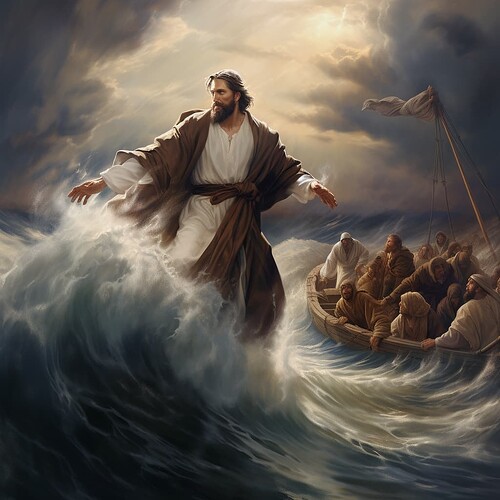![]() January 12: Matthew 14: Miracles and Martyrdom
January 12: Matthew 14: Miracles and Martyrdom
Discovering Faith in the Midst of Trials and Triumphs
 Introduction
Introduction
On January 12th, our journey through Matthew’s Gospel brings us to the dramatic and pivotal events of Matthew 14. This chapter presents a stark contrast between the martyrdom of John the Baptist and the miraculous power of Jesus, offering profound insights into faith, courage, and divine provision.
 Matthew 14:1-12: The Martyrdom of John the Baptist
Matthew 14:1-12: The Martyrdom of John the Baptist
The chapter begins with the tragic account of John the Baptist’s execution. Herod’s fear and Herodias’s grudge lead to John’s beheading, a moment that marks a somber reflection on the cost of prophetic truth-telling.
Key Verse: “John’s disciples came and took his body and buried it. Then they went and told Jesus.” — Matthew 14:12
 Matthew 14:13-21: The Feeding of the Five Thousand
Matthew 14:13-21: The Feeding of the Five Thousand
Following the news of John’s death, Jesus performs one of His most famous miracles: the feeding of the five thousand. This miracle not only displays Jesus’ compassion and power but also symbolizes spiritual nourishment.
Key Verse: “Taking the five loaves and the two fish and looking up to heaven, he gave thanks and broke the loaves.” — Matthew 14:19
 Matthew 14:22-33: Jesus Walks on Water
Matthew 14:22-33: Jesus Walks on Water
In a display of divine mastery over nature, Jesus walks on water, inviting Peter to join him. This event is not just a miracle but a lesson in faith and the presence of Christ in the midst of life’s storms.
Key Verse: “Lord, if it’s you,” Peter replied, “tell me to come to you on the water.” — Matthew 14:28
 Key Themes and Reflections:
Key Themes and Reflections:
The Cost of Faithfulness: The martyrdom of John the Baptist highlights the risks and costs associated with standing for truth and righteousness.
Divine Provision in Scarcity: The feeding of the five thousand illustrates Jesus’ ability to provide abundantly, even in situations of apparent scarcity.
Faith Amidst Uncertainty: Jesus walking on water and Peter’s initial success and subsequent fear reflect the dynamics of faith and doubt in challenging circumstances.
 Today’s Application:
Today’s Application:
Reflect on the courage it takes to stand for truth in the face of opposition, as exemplified by John the Baptist. Consider how Jesus’ miraculous provision can inspire trust in His ability to meet our needs. Ponder the balance between faith and fear in your own life, especially in times of uncertainty.
 Hidden Gem:
Hidden Gem:
Did you know? The feeding of the five thousand is the only miracle of Jesus recorded in all four Gospels, emphasizing its significance in Jesus’ ministry.
 Reflective Q&A:
Reflective Q&A:
![]() The Martyrdom of John the Baptist
The Martyrdom of John the Baptist
![]() How does John the Baptist’s martyrdom challenge and inspire us today?
How does John the Baptist’s martyrdom challenge and inspire us today?
A: John’s martyrdom challenges us to consider the cost of discipleship and inspires us to stand firm in our convictions, even in the face of persecution or death.
![]() The Feeding of the Five Thousand
The Feeding of the Five Thousand
![]() What lessons can we learn from Jesus’ miraculous feeding of the multitude?
What lessons can we learn from Jesus’ miraculous feeding of the multitude?
A: This miracle teaches us about Jesus’ compassion and power, reminding us that He can provide for our needs in miraculous ways, often beyond our expectations.
![]() Jesus Walks on Water
Jesus Walks on Water
![]() How does the story of Jesus walking on water speak to our faith journey?
How does the story of Jesus walking on water speak to our faith journey?
A: The story of Jesus walking on water reminds us to keep our eyes fixed on Him, especially in challenging times. It teaches us that faith requires stepping out into the unknown, trusting in Jesus’ power and presence.
 Join the Discussion:
Join the Discussion:
How do these events in Matthew 14 resonate with your experiences of faith, doubt, and divine intervention? Share your reflections and personal insights in the comments below!
#Matthew14 #Faith #Miracles #BibleStudy #SpiritualJourney #JesusChrist
![]() See You Tomorrow in Matthew: Continue with us on our journey through the Gospel of Matthew, as we discover more about Jesus’ teachings and miracles.
See You Tomorrow in Matthew: Continue with us on our journey through the Gospel of Matthew, as we discover more about Jesus’ teachings and miracles.
 Join the forum!
Join the forum!
Deepen your understanding and engagement with our AIgniteScripture Community:
Free Members: Engage in insightful discussions, access a wide range of biblical resources, and connect with a community of believers. Join here: 🌟 How to Join Page - Membership Options
Supporters Membership ($20/month or $200/year): Gain exclusive content, in-depth newsletters, and a supportive community for a richer faith experience. Become a Supporter: 🌟 How to Join Page - Membership Options
![]() Stay Connected with our AIgniteScripture Newsletter: Follow our daily scriptural journey enriched with AI insights. Subscribe to stay informed and inspired: https://newsletter.aignitescripture.com/
Stay Connected with our AIgniteScripture Newsletter: Follow our daily scriptural journey enriched with AI insights. Subscribe to stay informed and inspired: https://newsletter.aignitescripture.com/
